Maxwell waveguide boundary conditions
This module illustrates how to implement waveguide boundary conditions in Maxwell equations. So far it is done for 2D planar case in Cartezian and Axial (m = 0) cases. Waveguides modes and waveguides port are hardcoded.
Problem
The module uses Maxwell equations written for $\mathbf{E}$ field in $\exp(-i \omega t)$ presentation: $curl curl \mathbf{E} = \frac{\omega^2}{c^2} \epsilon(x,y) \mathbf{E}$ (here: $\omega$ - is the frequency, $c$ - the speed of light, $\epsilon$ - dielectric permittivity; the CGS system of units is used).
This module illustrates how to set boundary condition so that there is two waveguide ports through one of which an input signal enters. That is it solves a simple waveguide scattering problem
Variational form
Variational form is:
\[\int_V dV ( curl(\mathbf{E}) curl(\mathbf{V}) - \frac{\omega^2}{c^2} \epsilon(x,y) \mathbf{E} \mathbf{V}) + \int_{dV} dS curl (\mathbf{E}) \mathbf{V} = 0\]For waveguide ports the last term in the left hand side is written as:
\[\int_{dS_{port}} curl \mathbf{E} \mathbf{V} = \sum_{s=1,N_{modes}} C_s \int_{dS} curl \mathbf{E_s} \mathbf{V}\]Here C_s is the amplitude of mode $s$ and $\mathbf(E_s)$ - the s-th mode’s electric field. The $C_s$ in its turn is written as:
\[C_s = \frac{1}{N_s} \int_{S_{port}} dS ( \mathbf{E} \times \mathbf{H_s} - \mathbf{E_s} \times \mathbf{H})\], here $\mathbf{H}$ and $\mathbf{H_s}$ are current and mode’s magnetic field which are found from Maxwell equations, $N_s$ is the norm.
Finally, the last term of the LHS side can be written in term of the direct product as:
\[\int_{dS_{port}} curl \mathbf{E} \mathbf{V} = \sum_{s=1,N_{modes}} \frac{1}{N_s} \int_{S_{port}} dS ( \mathbf{E} \times \mathbf{H_s} - \mathbf{E_s} \times \mathbf{H}) \bigotimes \int_{dS} curl \mathbf{E_s} \mathbf{V},\]that allows one to implement it by means of FreeFEM tools without low-level matrix assembly (for the price of performance, of course).
Algorithms
2D - Cartesian
Hardcoded TE modes. File cartezian2D_TEmodes.idp:
// cartezian2D_TEmodes.idp
func real Kappate(int modeNumber, real size1, real size2)
{
return pi*modeNumber/size1;
}
func complex anEte(real xx, real yy, int modeNumber, int componentNumber, real size1, real size2, real k)
{
real kp = Kappate(abs(modeNumber), size1, 0);
real h = H(k, kp);
real sign = 0; if(modeNumber >= 0) sign = 1.; else sign = -1.;
if(componentNumber == 3){
return -sin(kp*yy)*(1. + 0*1i)*sqrt(k/h)*exp(1i*h*xx*sign);
}
return 0*1i;
}
func complex anHte(real xx, real yy, int modeNumber, int componentNumber, real size1, real size2, real k)
{
real kp = Kappate(abs(modeNumber), size1, 0);
real h = H(k, kp);
real sign = 0; if(modeNumber >= 0) sign = 1.; else sign = -1.;
if(componentNumber == 3){
return 0;
}
if(componentNumber == 2){
return -sin(kp*yy)*sqrt(h/k)*sign*exp(1i*h*xx*sign);
}
if(componentNumber == 1){
return kp*cos(kp*yy)/(1i*k)*sqrt(k/h)*exp(1i*h*xx*sign);
}
return 0*1i;
}
func real fNormte(int modeNumber, real size1)
{
return 1.*size1;
}Hardcoded TM modes. File cartezian2D_TMmodes.idp
// cartezian2D_TMmodes.idp
func real Kappatm(int modeNumber, real size1, real size2)
{
return pi*(modeNumber-1)/size1;
}
func complex anHtm(real xx, real yy, int modeNumber, int componentNumber, real size1, real size2, real k)
{
real kp = Kappatm(abs(modeNumber), size1, 0);
real h = H(k, kp);
real sign = 0; if(modeNumber >= 0) sign = 1.; else sign = -1.;
if(componentNumber == 3){
return cos(kp*yy)*sqrt(k/h)*exp(1i*h*xx*sign);
}
return 0;
}
func complex anEtm(real xx, real yy, int modeNumber, int componentNumber, real size1, real size2, real k)
{
real kp = Kappatm(abs(modeNumber), size1, 0);
real h = H(k, kp);
real sign = 0; if(modeNumber >= 0) sign = 1.; else sign = -1.;
if(componentNumber == 3){
return 0;
}
if(componentNumber == 2){
return cos(kp*yy)*sqrt(h/k)*exp(1i*h*xx*sign)*sign;
}
if(componentNumber == 1){
return kp*sin(kp*yy)/(1i*sqrt(k*h))*exp(1i*h*xx*sign);
}
return 0*1i;
}
func real fNormtm(int modeNumber, real size1)
{
if(abs(modeNumber) == 1) return 2.*size1;
else return 1.*size1;
}Script for intermixing TM and TE modes. File cartezian2D_modes.idp:
// cartezian2D_modes.idp
func real H(real k, real kp)
{
return sqrt(k*k-kp*kp);
}
include "cartezian2D_TEmodes.idp"
include "cartezian2D_TMmodes.idp"
func complex anE(real xx, real yy, int modeNumber, int componentNumber, real size1, real size2, real k)
{
real sign = 0; if(modeNumber >= 0) sign = 1.; else sign = -1.;
if(abs(modeNumber) % 2 == 0)
return anEte(xx, yy, abs(modeNumber)/2*sign, componentNumber, size1, size2, k);
else
return anEtm(xx, yy, (modeNumber+sign*1)/2, componentNumber, size1, size2, k);
}
func complex anH(real xx, real yy, int modeNumber, int componentNumber, real size1, real size2, real k)
{
real sign = 0; if(modeNumber >= 0) sign = 1.; else sign = -1.;
if(abs(modeNumber) % 2 == 0)
return anHte(xx, yy, abs(modeNumber)/2*sign, componentNumber, size1, size2, k);
else
return anHtm(xx, yy, (modeNumber+sign*1)/2, componentNumber, size1, size2, k);
}
func real fNorm(int modeNumber, real size1)
{
real sign = 0; if(modeNumber >= 0) sign = 1.; else sign = -1.;
if(abs(modeNumber) % 2 == 0)
return fNormte( abs(modeNumber)/2*sign, size1);
else
return fNormtm((modeNumber+sign*1)/2, size1);
}
func real Kappa(int modeNumber, real size1, real size2)
{
real sign = 0; if(modeNumber >= 0) sign = 1.; else sign = -1.;
if(modeNumber % 2 == 0)
return Kappate(modeNumber/2, size1, 0);
else
return Kappatm((modeNumber+1)/2, size1, 0);
}Finally, the main script:
load "Element_Mixte"
func complex epsilon(real xx, real yy)
{
return 1. + 0*1i;
// if(xx > 0.25 && xx < 0.75/* && yy > 0.25 && yy < 0.75*/) return 5;
// else return 1.;
}
include "cartezian2D_modes.idp"
//include "cartezian2D_TE_only.idp"
//include "cartezian2D_TM_only.idp"
real height = 1;
real length = 2;
func mesh generateMesh()
{
return square(50,10, [x*length, y*height]);
}
int rightBorderLabel = 2;
int leftBorderLabel = 4;
mesh Th = generateMesh();
plot(Th);
fespace Vh(Th,[RT1Ortho, P2]); // finite element space
func matrix<complex> MakswellEqs(real sigma, int m)
{
varf MKSWL([Ex,Ey, Ez],[vEx, vEy, vEz]) =
int2d(Th)(
(
(dy(Ez) - 1i*m*Ey )*conj(dy(vEz)- 1i*m*vEy ) //curl_x
+ (dx(Ey) - dy(Ex))*conj(dx(vEy) - dy(vEx)) //curl_z
+ (1i*m*Ex - dx(Ez))*conj(1i*m*vEx - dx(vEz)) //curl_y
)
-sigma*epsilon(x,y)*(conj(vEy)*Ey+conj(vEz)*Ez + conj(vEx)*Ex)
)
+ on(1, 3, Ex = 0, Ey = 0, Ez = 0)
;
matrix<complex> OP = MKSWL(Vh, Vh, solver=UMFPACK);
return OP;
}
func complex[int] vectorBCh(int modeNum, int boundaryLabel, real k)
{
varf BoundCondRot([Ex,Ey,Ez],[vEx,vEy,vEz]) =
int1d(Th,boundaryLabel)(
(
anH(x, y, (N.x)*modeNum, 1, height, 0, k)*conj(0*vEy - N.y*vEz)
+ anH(x, y, (N.x)*modeNum, 2, height, 0, k)*conj(N.x*vEz - 0*vEx)
+ anH(x, y, (N.x)*modeNum, 3, height, 0, k)*conj(N.y*vEx - N.x*vEy)
)*(1i*k) // [n v*] curl E = [n v*] (i k H)
);
complex[int] BCr = BoundCondRot(0,Vh);
return BCr;
}
func complex[int] vectorBCe(int modeNum, int boundaryLabel, real k)
{
varf BoundCondField([Ex,Ey,Ez],[vEx,vEy,vEz]) =
int1d(Th,boundaryLabel)
(
(conj(
- vEz*anH(x, y, (N.x)*modeNum, 2, height, 0, k)
- anE(x, y, (N.x)*modeNum, 3, height, 0, k)*(dx(vEz)/(1i*k) )
+ vEy *anH(x, y, (N.x)*modeNum, 3, height, 0, k)
- anE(x, y, (N.x)*modeNum, 2, height, 0, k)*((dx(vEy) - dy(vEx))/(1i*k))
)*(N.x)
)
/fNorm(modeNum, height)
);
complex[int] BCrf = BoundCondField(0,Vh);
return BCrf;
}
func matrix<complex> matrixBC(int modeNum, int boundaryLabel, real k)
{
complex[int] BCr = vectorBCh( modeNum, boundaryLabel,k);
complex[int] BCrf = vectorBCe( -modeNum, boundaryLabel,k);
matrix<complex> Br = BCr*BCrf'; // 'cartesian product
return Br;
}
func matrix<complex> generateBCMatrix(int numberOfModes, int boundaryLabel, int sign, real k)
{
matrix<complex> Br1;
for(int i = 1; i <= numberOfModes; i++)
{
matrix<complex> Br2 = matrixBC(sign*i, boundaryLabel, k);
Br1 = Br1 + Br2;
}
return Br1;
}
func complex[int] modeAmplitudes
(complex[int]& eVec, int numOfModes, int referenceMode, int inputBoundaryLabel, int otherBoundaryLabel, real k, bool needdB)
{
complex[int] result(numOfModes);
Vh<complex> [ex,ey,ez];
ex[] = eVec;
if(needdB) for(int i = 0; i < numOfModes; i++) result(i) = log10(0.);
complex[int] probe = vectorBCe( -referenceMode, inputBoundaryLabel, k);
complex power = eVec'*probe; //'
cout<<"mode = "<<referenceMode<<" power = "<<abs(power)<<", "<<power<<endl;
for(int testmode = 0; testmode < numOfModes; testmode++)
{
// complex[int] probe2 = vectorBCe( (testmode+1), otherBoundaryLabel);
// complex res = eVec'*probe2/power; //'
complex res = int1d(Th,otherBoundaryLabel)
(
(
conj(
- ez*anH(x, y, -(N.x)*(testmode+1), 2, height, 0, k)
- anE(x, y, -(N.x)*(testmode+1), 3, height, 0, k)*(dx(ez)/(1i*k) )
+ ey*anH(x, y, -(N.x)*(testmode+1), 3, height, 0, k)
- anE(x, y, -(N.x)*(testmode+1), 2, height, 0, k)*((dx(ey) - dy(ex))/(1i*k))
)*(N.x)
)
/(fNorm(-(N.x)*(testmode+1), height)*power)
);
if(needdB) result(testmode) = 20*log10(abs(res));
else result(testmode) = res;
}
return result;
}
real sigma = 9.*pi*pi+3.;
real k = sqrt(sigma);
cout<<"h1 = "<<H(k, Kappa(1,1,1))<<", kappa1 = "<<Kappa(1,1,1)<<endl;
cout<<"h2 = "<<H(k, Kappa(2,1,1))<<", kappa2 = "<<Kappa(2,1,1)<<endl;
cout<<"h3 = "<<H(k, Kappa(3,1,1))<<", kappa3 = "<<Kappa(3,1,1)<<endl;
cout<<"h4 = "<<H(k, Kappa(4,1,1))<<", kappa4 = "<<Kappa(4,1,1)<<endl;
int numberOfModesToAccount = 4;
matrix<complex> Br = generateBCMatrix(numberOfModesToAccount, rightBorderLabel,1, k);
matrix<complex> Bl = generateBCMatrix(numberOfModesToAccount, leftBorderLabel, 1, k);
matrix<complex> OP = MakswellEqs(sigma, 0) ;
matrix<complex> A; //A = OP + generateBCMatrix(...) + generateBCMatrix(...) produces order dependent incorrect result
A = OP; //tested FreeFem++ v 3.56
A = A + Br;
A = A + Bl;
complex[int] u(Bl.n);
set(A, solver = UMFPACK);
complex[int] RHS = vectorBCh(2 , leftBorderLabel, k);
u = A^-1*(RHS);
Vh<complex> [Ex,Ey,Ez];
Ex[] = u;
// plot(Ex, fill = true, cmm = "Ex");
plot(Ey, fill = true, cmm = "Ey");
plot(Ez, fill = true, cmm = "Ez");
cout<< modeAmplitudes(u, numberOfModesToAccount, -2, leftBorderLabel, leftBorderLabel, k, true)<<endl;
cout<< modeAmplitudes(u, numberOfModesToAccount, -2, leftBorderLabel, rightBorderLabel, k, true)<<endl;2D - axial-symmetric
In the axial-symmetric case dimensionless norm and transversal wave numbers are read from file modes_m=0.txt. If only TE or TM modes are required, just delete unnecessary raws. The first lines is the lines number. For the rest: the first column is Bessel funstion or Bessel function prime zeros, the second column is the mode type (TE or TM), the next is M=0, the last is the dimensionless norm. modes_m=0.txt:
19
2.404825557695773 1 0 0.7793251491983979
3.8317059702075125 0 0 1.190818894252844
5.5200781102863115 1 0 1.763983488461943
7.0155866698156215 0 0 2.2165400124021
8.653727912911013 1 0 2.7590751389668657
10.173468135062722 0 0 3.226726175661221
11.791534439014281 1 0 3.7566997735908174
13.323691936314221 0 0 4.232168817077737
14.930917708487787 1 0 4.755305323217033
16.470630050877634 0 0 5.235551752495418
18.071063967910924 1 0 5.754389740203993
19.615858510468243 0 0 6.237857058819471
21.21163662987926 1 0 6.753743000677423
22.760084380592772 0 0 7.239528520160257
24.352471530749302 1 0 7.753262043197564
25.903672087618382 0 0 8.240795797022049
27.493479132040253 1 0 8.752890449018484
29.046828534916855 0 0 9.241789609116804
30.634606468431976 1 0 9.752594764648169
Hardcoded TE modes, file axial2D_TEmodes.idp:
//axial2D_TEmodes.idp
func real Kappate(int modeNumber, real size1, real size2)
{
return kappas[abs(modeNumber)-1]/size1;
}
func complex anEte(real xx, real yy, int modeNumber, int M, int componentNumber, real size1, real size2, real k)
{
if(M!=0){ cout<< "M != 0: feature not implemented" <<endl; exit(-1);}
real kp = Kappate(modeNumber, size1, 0);
real h = H(k, kp);
real sign = 0; if(modeNumber >= 0) sign = 1.; else sign = -1.;
real rho = kp*yy;
real mu = kp*size1;
//cout << kp << "," << h << "," << rho << endl;
int m = M*sign;
if(componentNumber == 2){ //r
return 0; // k*m*jn(M, rho)*exp(1i*h*xx*sign)/yy; // m == 0
}
if(componentNumber == 3){//phi
real jnDash = 0.5*(jn(M-1, rho) - jn(M+1, rho));
return 1i*k*mu*(jnDash)*exp(1i*h*xx*sign)/size1;
}
return 0*1i;
}
func complex anHte(real xx, real yy, int modeNumber, int M, int componentNumber, real size1, real size2, real k)
{
if(M!=0){ cout<< "M != 0: feature not implemented" <<endl; exit(-1);}
real kp = Kappate(abs(modeNumber), size1, 0);
real h = H(k, kp);
real sign = 0; if(modeNumber >= 0) sign = 1.; else sign = -1.;
real rho = kp*yy;
real mu = kp*size1;
real m = M*sign;
if(componentNumber == 3){//phi
return 0; // h*m*sign*jn(M, rho)*exp(1i*h*xx*sign); // m == 0
}
if(componentNumber == 2){//r
real jnDash = 0.5*(jn(M-1, rho) - jn(M+1, rho));
return -1i*h*sign*mu*jnDash/size1*exp(1i*h*xx*sign);
}
if(componentNumber == 1){//z
return (-k*k + h*h)*jn(M, rho)*exp(1i*h*xx*sign);
}
return 0*1i;
}
func real fNormte(int modeNumber, real size1, real k)
{
real kp = Kappate(modeNumber, size1, 0);
real h = H(k, kp);
return 4.*pi*h*k*norma[abs(modeNumber)-1];
}Hardcoded TM modes, file axial2D_TMmodes.idp:
func real Kappatm(int modeNumber, real size1, real size2)
{
return kappas[abs(modeNumber)-1]/size1;
}
func complex anHtm(real xx, real yy, int modeNumber, int M, int componentNumber, real size1, real size2, real k)
{
if(M!=0){ cout<< "M != 0: feature not implemented" <<endl; exit(-1);}
real kp = Kappatm(modeNumber, size1, 0);
real h = H(k, kp);
real sign = 0; if(modeNumber >= 0) sign = 1.; else sign = -1.;
real rho = kp*yy;
real mu = kp*size1;
int m = M*sign;
if(componentNumber == 2){ //r
return 0; //-k*m*jn(M, rho)*exp(1i*h*xx*sign)/yy; // m == 0
}
if(componentNumber == 3){//phi
real jnDash = 0.5*(jn(M-1, rho) - jn(M+1, rho));
return -1i*k*mu*(jnDash)*exp(1i*h*xx*sign)/size1;
}
return 0*1i;
}
func complex anEtm(real xx, real yy, int modeNumber, int M, int componentNumber, real size1, real size2, real k)
{
if(M!=0){ cout<< "M != 0: feature not implemented" <<endl; exit(-1);}
real kp = Kappatm(abs(modeNumber), size1, 0);
real h = H(k, kp);
real sign = 0; if(modeNumber >= 0) sign = 1.; else sign = -1.;
real rho = kp*yy;
real mu = kp*size1;
real m = M*sign;
if(componentNumber == 3){//phi
return 0; // h*m*sign*jn(M, rho)*exp(1i*h*xx*sign)/(yy); // m == 0
}
if(componentNumber == 2){//r
real jnDash = 0.5*(jn(M-1, rho) - jn(M+1, rho));
return -1i*h*sign*mu*jnDash/size1*exp(1i*h*xx*sign);
}
if(componentNumber == 1){//z
return (-k*k + h*h)*jn(M, rho)*exp(1i*h*xx*sign);
}
return 0*1i;
}
func real fNormtm(int modeNumber, real size1, real k)
{
real kp = Kappatm(modeNumber, size1, 0);
real h = H(k, kp);
return -4*pi*h*k*norma[abs(modeNumber)-1];
}Script for intermixing TM and TE modes. File axial2D_modes.idp:
// axial2D_modes.idp
ifstream modeInput("modes_m=0.txt");
int modesNumInput;
modeInput >> modesNumInput;
real[int] kappas(modesNumInput);
int[int] modeType(modesNumInput);
int[int] modeM (modesNumInput);
real[int] norma(modesNumInput);
for(int i = 0; i < modesNumInput; i++){
modeInput >> kappas[i] >> modeType[i] >> modeM[i] >> norma[i];
cout <<"i = "<<i << ", kappa = "<<kappas[i]<<", modeType ="<<modeType[i]<<", modeM = "<<modeM[i]<<", norma = "<<norma[i]<<endl;
}
func real H(real k, real kp)
{
return sqrt(k*k-kp*kp);
}
include "axial2D_TEmodes.idp"
include "axial2D_TMmodes.idp"
func complex anE(real xx, real yy, int modeNumber, int componentNumber, real size1, real size2, real k)
{
int absM = abs(modeNumber-1);
if(modeType[absM] == 0)
return anEte(xx, yy, modeNumber, modeM[absM], componentNumber, size1, size2, k);
else
return anEtm(xx, yy, modeNumber, modeM[absM], componentNumber, size1, size2, k);
return 0;
}
func complex anH(real xx, real yy, int modeNumber, int componentNumber, real size1, real size2, real k)
{
int absM = abs(modeNumber)-1;
if(modeType[absM] == 0)
return anHte(xx, yy, modeNumber, modeM[absM], componentNumber, size1, size2, k);
else
return anHtm(xx, yy, modeNumber, modeM[absM], componentNumber, size1, size2, k);
return 0;
}
func real fNorm(int modeNumber, real size1, real k)
{
int absM = abs(modeNumber);
if(modeType[absM-1] == 0)
return fNormte( modeNumber, size1, k);
else
return fNormtm( modeNumber, size1, k);
return 0;
}
func real Kappa(int modeNumber, real size1, real size2)
{
int absM = abs(modeNumber);
if(modeType[absM-1] == 0)
return Kappate(modeNumber, size1, 0);
else
return Kappatm(modeNumber, size1, 0);
return 0;
}Finally, the main script. Note that in 2D axial symmetric Maxwell equations (in axial cut) the variable $r E_{\phi}$ is used rather than $E_{\phi}$
load "Element_Mixte"
func complex epsilon(real xx, real yy)
{
return 1. + 0*1i;
// if(xx > 0.25 && xx < 0.75 && yy > 0.25 && yy < 0.75) return 5; else return 1.;
}
real height = 3;
real length = 3;
func mesh generateMesh()
{
return square(60,30, [x*length, y*height]);
}
mesh Th = generateMesh();
int rightBorderLabel = 2;
int leftBorderLabel = 4;
include "axial2D_modes.idp"
//plot(Th);
fespace Vh(Th,[RT1Ortho, P2]); // finite element space
func matrix<complex> MakswellEqs(real sigma, int m, real h)
{
varf MKSWL([Ez,Er, Ephi],[vEz,vEr, vEphi]) =
int2d(Th)(
(
(dy(Ephi) - 1i*m*Er )*conj(dy(vEphi)- 1i*m*vEr )/y //curl_z // vEphi => (Ephi*y)
+ (dx(Er) - dy(Ez))*conj(dx(vEr) - dy(vEz))*y //curl_phi
+ (1i*m*Ez - dx(Ephi))*conj(1i*m*vEz - dx(vEphi))/y //curl_r
)
-sigma*y*epsilon(x,y)*(conj(vEr)*Er+conj(vEphi)*Ephi/(y*y)+conj(vEz)*Ez)
)
+ on(3, Ez = 0, Er = 0, Ephi = 0)
+ on(1, Ephi = 0) //Er at the axis does not change anything due to RT1Ortho elements
;
matrix<complex> OP = MKSWL(Vh, Vh, solver=UMFPACK);
return OP;
}
func complex[int] vectorBCh(int modeNum, int boundaryLabel, real k)
{
int m = modeM [abs(modeNum)];
varf BoundCondRot([Ex,Ey,Ez],[vEx,vEy,vEz]) =
int1d(Th,boundaryLabel)(
( // x -> z, y -> r, z -> phi
anH(x, y, (N.x)*modeNum, 1, height, 0, k)*conj( - N.y*vEz)
+ anH(x, y, (N.x)*modeNum, 2, height, 0, k)*conj(N.x*vEz)
+ anH(x, y, (N.x)*modeNum, 3, height, 0, k)*conj(N.y*vEx - N.x*vEy)*y
)*(1i*k)
); // [n v*] curl E = [n v*] (i k H)
complex[int] BCr = BoundCondRot(0,Vh);
return BCr;
}
func complex[int] vectorBCe(int modeNum, int boundaryLabel, real k)
{
int m = modeM [abs(modeNum)];
cout<<"modeNum = "<<modeNum<<endl;
varf BoundCondField([Ex,Ey,Ez],[vEx,vEy,vEz]) =
int1d(Th,boundaryLabel)(
( // x(1) -> z, y(2) -> r, z(3) -> phi; n [Es Hv]
2.*pi*conj(
- (vEz)*anH(x, y, (N.x)*modeNum, 2, height, 0, k)
+ (anE(x, y, (N.x)*modeNum, 3, height, 0, k))*((-dx(vEz) + 1i*m*vEx) / (1i*k) ) //Ez = anE(..,3,..)*y
+ (vEy) *anH(x, y, (N.x)*modeNum, 3, height, 0, k) * y
- anE(x, y, (N.x)*modeNum, 2, height, 0, k)*((dx(vEy) - dy(vEx))/(1i*k) * y)
)*(N.x)
) /fNorm(modeNum, height, k)
);
complex[int] BCrf = BoundCondField(0,Vh);
return BCrf;
}
func matrix<complex> matrixBC(int modeNum, int boundaryLabel, real k)
{
complex[int] BCr = vectorBCh( modeNum, boundaryLabel,k);
complex[int] BCrf = vectorBCe( -modeNum, boundaryLabel,k);
matrix<complex> Br = BCr*BCrf'; // 'cartesian product
return Br;
}
func matrix<complex> generateBCMatrix(int numberOfModes, int boundaryLabel, int sign, real k)
{
matrix<complex> Br1;
for(int i = 1; i <= numberOfModes; i++)
{
matrix<complex> Br2 = matrixBC(sign*i, boundaryLabel, k);
Br1 = Br1 + Br2;
}
return Br1;
}
func complex[int] modeAmplitudes //complimentary function for calculating scattering parameters
(complex[int]& eVec, int numOfModes, int referenceMode, int inputBoundaryLabel, int otherBoundaryLabel, real k, bool needdB)
{
complex[int] result(numOfModes);
Vh<complex> [ex,ey,ez];
ex[] = eVec;
if(needdB) for(int i = 0; i < numOfModes; i++) result(i) = log10(0.);
complex[int] probe = vectorBCe(-referenceMode, inputBoundaryLabel, k);
Vh<complex> [pex, pey, pez];
pex[] = probe;
int m = modeM [abs(referenceMode)-1];
complex power = eVec'*probe; //'
for(int testmode = 0; testmode < numOfModes; testmode++)
{
int m = modeM [testmode];
int modeNum = -(testmode + 1);
complex tmpPower = 1;
if(abs(power) != 0) tmpPower = power;
complex res = int1d(Th,otherBoundaryLabel)((// x -> z, y -> r, z -> phi; n [Es Hv]
2.*pi*y*
conj(
- (ez/y)*anH(x, y, modeNum, 2, height, 0, k)
+ (anE(x, y, modeNum, 3, height, 0, k))*(-(dx(ez)/y + 1i*m*ex/y) / (1i*k) ) //Ez = anE(..,3,..)*y
+ (ey) *anH(x, y, modeNum, 3, height, 0, k)
- anE(x, y, modeNum, 2, height, 0, k)*((dx(ey) - dy(ex))/(1i*k))
)*(N.x)
)
/(fNorm(modeNum, height, k)*tmpPower));
if(needdB) result(testmode) = 20*log10(abs(res));
else result(testmode) = res;
}
return result;
}
real sigma = 9.*pi*pi-81.5;
real k = sqrt(sigma);
cout<<"h1 = "<<H(k, Kappa(1,height,1))<<", kappa1 = "<<Kappa(1,height,1)<<", k = "<<k<<", beta_ph = "<<k/H(k, Kappa(1,height,1))<<endl;
cout<<"h2 = "<<H(k, Kappa(2,height,1))<<", kappa2 = "<<Kappa(2,height,1)<<", k = "<<k<<", beta_ph = "<<k/H(k, Kappa(2,height,1))<<endl;
cout<<"h3 = "<<H(k, Kappa(3,height,1))<<", kappa3 = "<<Kappa(3,height,1)<<", k = "<<k<<", beta_ph = "<<k/H(k, Kappa(3,height,1))<<endl;
cout<<"h4 = "<<H(k, Kappa(4,height,1))<<", kappa3 = "<<Kappa(4,height,1)<<", k = "<<k<<", beta_ph = "<<k/H(k, Kappa(4,height,1))<<endl;
int numberOfModesToAccount = 2;
int targetMode = 1;
matrix<complex> Br = generateBCMatrix(numberOfModesToAccount, rightBorderLabel,1, k);
matrix<complex> Bl = generateBCMatrix(numberOfModesToAccount, leftBorderLabel, 1, k);
matrix<complex> OP = MakswellEqs(sigma, 0, 0) ;
matrix<complex> A; //A = OP + generateBCMatrix(...) + generateBCMatrix(...) produces
A = OP; //order dependent incorrect result tested FreeFem++ v 3.56
A = A + Br;
A = A + Bl;
complex[int] u(Br.n);
set(A, solver = UMFPACK);
complex[int] RHS = vectorBCh(targetMode , leftBorderLabel, k);
u = A^-1*(RHS);
Vh<complex> [Ex,Ey,Ez];
Ex[] = u;
fespace Uh (Th, P1);
Uh<complex> Ezreal = Ez/(y+1e-10);
Uh<complex> Exnorm = Ex;
plot(Ex, fill = true, cmm = "EX NORM");
plot(Ey, fill = true, cmm = "EY");
plot(Ezreal, fill = true, cmm = "EZ");
cout<< modeAmplitudes(u, numberOfModesToAccount, -targetMode, leftBorderLabel, rightBorderLabel, k, false)<<endl;
cout<< modeAmplitudes(u, numberOfModesToAccount, -targetMode, leftBorderLabel, leftBorderLabel, k, false)<<endl;Validation
Following examples show reflectiveless transition of a waveguide mode traveling from one port (left) to an other (right).
2D, Cartezian
Left and right borders are waveguide ports. Input mode TE1
| Mode TE1, abs(Ez) |
|---|
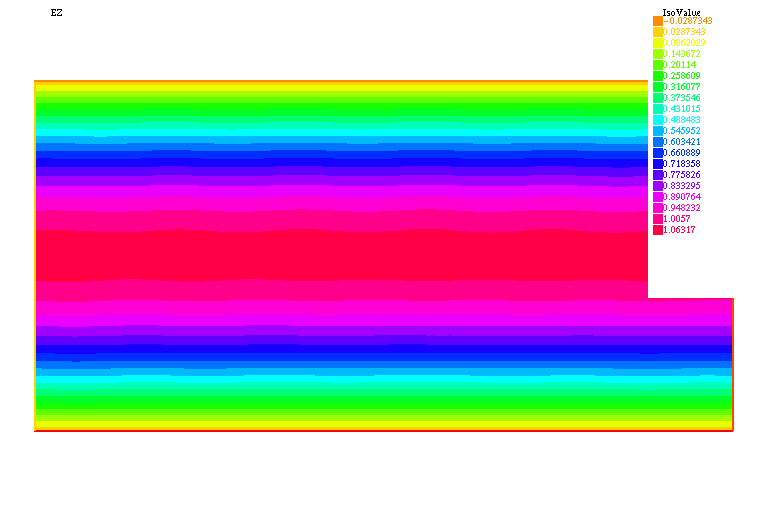 |
| Mode TE1, Re(Ez) |
|---|
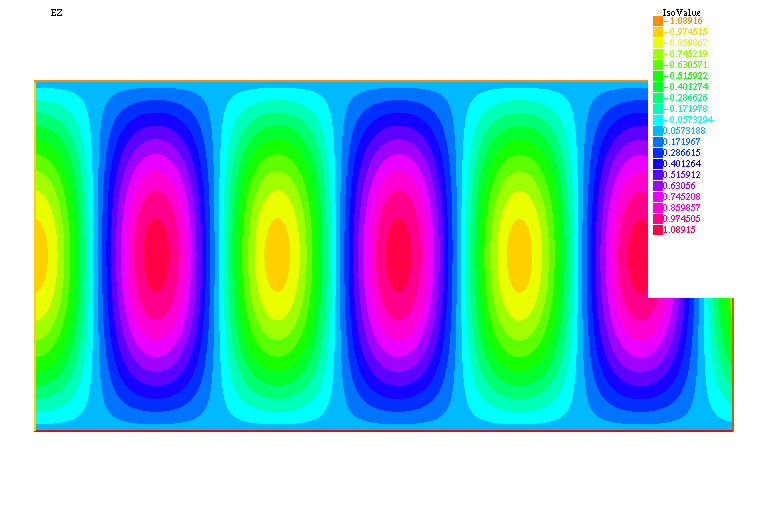 |
Left and right borders are waveguide ports. Input mode TM1
| Mode TM1, abs(Ex) |
|---|
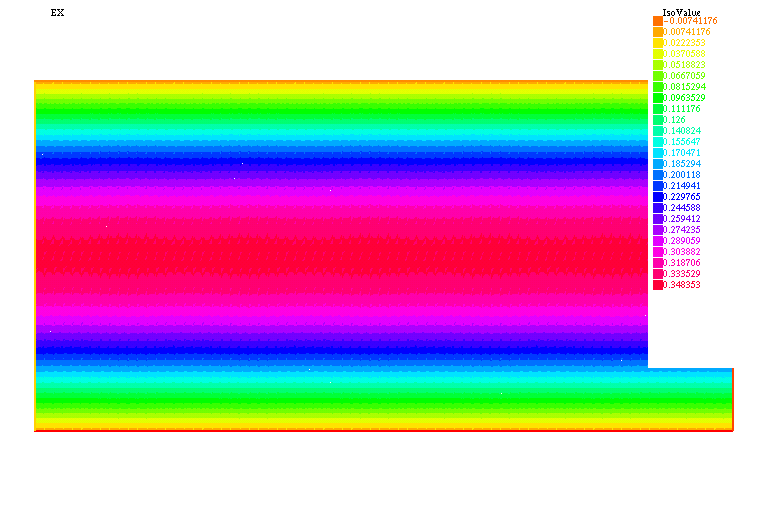 |
| Mode TM1, abs(Ey) |
|---|
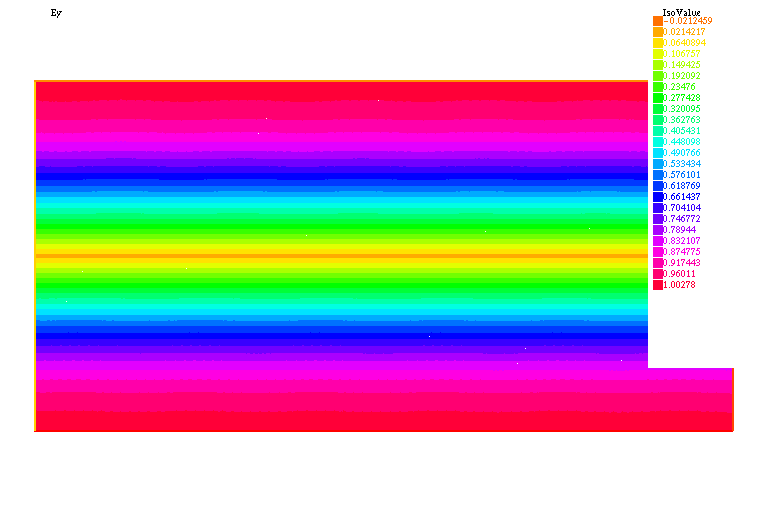 |
2D, axial-symmetric
| Mode TE01, abs(Ephi) |
|---|
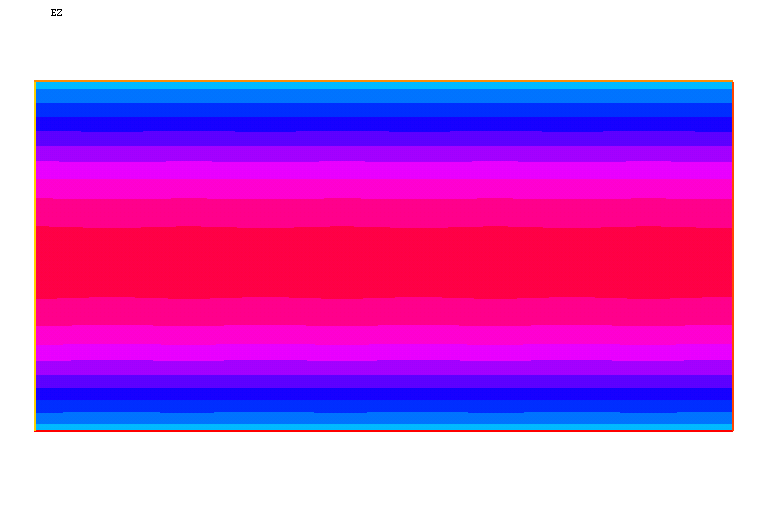 |
| Mode TE01, Re(Ephi) |
|---|
 |
| Mode TM02, abs(Ez) |
|---|
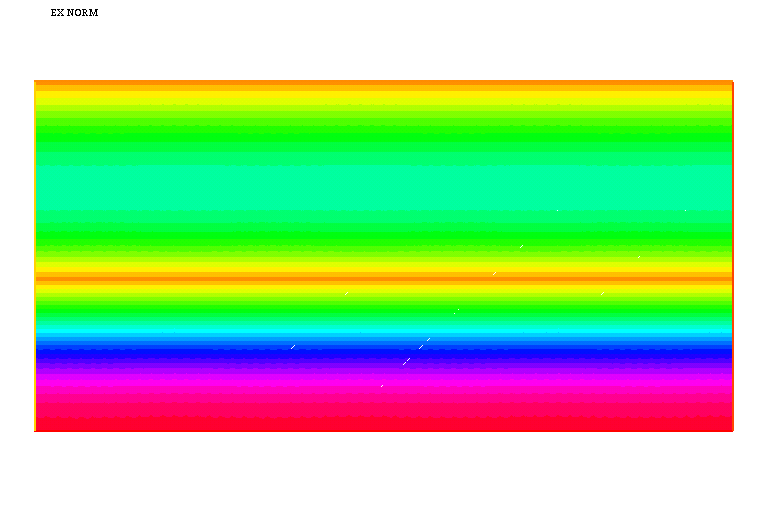 |
| Mode TM02, abs(Er) |
|---|
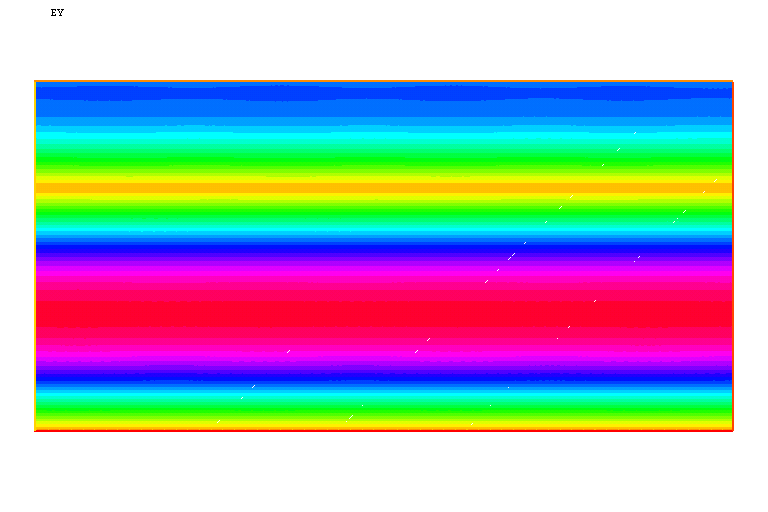 |
